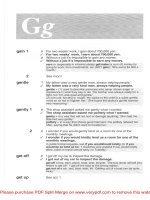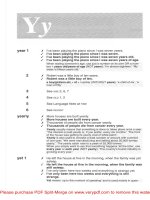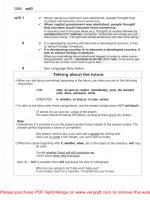Collins Common Errors
Bạn đang xem bản rút gọn của tài liệu. Xem và tải ngay bản đầy đủ của tài liệu tại đây (1.22 MB, 305 trang )
2
Contents
Introduction
Verbs
Verb patterns
Prepositions after verbs
Modal verbs (can, must, should etc.)
Using special types of verb
Phrasal verbs
Tenses
Present tenses
Past tenses
Future tenses
Irregular verbs
Nouns
Uncountable, mass, and plural nouns
Use of articles
Determiners and quantifiers
Prepositions and verb patterns
Plurals
Adjectives
Position of adjectives
Comparing adjectives
Expressing degree with adjectives
ing and -ed adjectives
Prepositions after adjectives
Structures after adjectives
Determiner + adjective + noun/one
3
Adverbs and Adverbial Phrases
How to use adverbs and adverbial phrases
Position of adverbs and adverbial phrases
Comparing adverbs
Pronouns
Personal pronouns
Possessive pronouns
Reflexive pronouns
Other types of pronoun
Position of pronouns
Prepositions
Sentences
Questions
Question tags
Answers
Negatives
Conjunctions
Conditionals
Relative clauses
Phrases
Collocation
Which Word?
Confusable Words
Words that sound the same
Other words that are often confused
Topics
Numbers
Time
Travel
Age
4
Meals
Colours
Speaking
Spelling
General spelling rules
Punctuation
Apostrophes [’]
Commas [,]
Question marks [?]
Quotation marks [‘ ’ or “ ”]
Capital letters
Exercises and Solutions
Glossary
Index
Copyright
About the Publisher
5
Introduction
Collins Common Errors in English is a practical guide to the
mistakes that learners of English often make and how to avoid
them. Whether you are preparing for an exam, writing an
essay, or you simply want to make sure that your English is as
accurate as possible, Collins Common Errors in English offers
you the information you need in a clear and accessible form.
This book is in several parts:
• The first sections are organized by part of speech. In short,
clear paragraphs, they explain the most common errors
connected with each part of speech. For instance, the section
on verbs covers areas such as using the correct preposition
after a verb, and how to avoid mistakes with modal verbs
and phrasal verbs. These sections also include information
on tenses and making sentences.
• The next sections focus on choosing the right word. There
are many reasons why it can be easy to confuse words. It
may be because they sound the same or look similar (eg
board/bored, desert/dessert), because they have similar
but slightly different meanings (eg continual/continuous,
blame/fault), or because it is easy to confuse the different
parts of speech (eg breath and breathe). Many mistakes are
made because of a confusion with another language (eg
actual/current, library/bookshop), and these sections deal
with those errors too.
• After this come the topic sections, which cover areas which
are often prone to a lot of mistakes, such as time, travel, and
numbers. For each of these, clear information is given to
help you talk about the topics confidently and accurately.
• Finally, you will find information on common mistakes with
6
punctuation and spelling, followed by several pages of
exercises which you can use to test what you have learned
or to see where you need more help.
Within each section, mistakes are introduced with clear
headings. There is also a comprehensive index and a helpful
glossary at the end of the book to help you find all the
information you need.
For more information about Collins dictionaries, you can visit
us at www.collinslanguage.com.
7
Verbs
8
Verb patterns
Verb +to- infinitive
We agreed to go to his house.
We agreed go to his house.
I managed to finish the painting.
I managed finishing the painting.
Here is a list of common verbs that are used with a toinfinitive, and rarely or never with an infinitive without to or
an ‑ing verb:
afford
agree
aim
appear
arrange
ask
attempt
choose
claim
dare
decide
demand
deserve
expect
9
fail
fight
forget
grow
help
hesitate
hope
intend
learn
manage
mean
need
offer
plan
prepare
pretend
promise
refuse
seem
tend
threaten
wait
want
wish
Verb + object + to- infinitive
10
They invited her to speak at the conference.
They invited her for speaking at the conference.
I asked him to close the door.
I asked him close the door.
Here is a list of common verbs that are used with an object
and a to- infinitive, and rarely or never with an infinitive
without to or a preposition + ‑ing verb:
advise
allow
ask
beg
cause
choose
enable
encourage
expect
forbid
force
get
help
invite
order
pay
persuade
prefer
remind
11
teach
tell
train
trust
want
warn
Verb + object + infinitive without to
I made him listen.
I made him to listen.
He let me come with him.
He let me coming with him.
Make (meaning ‘force’) and let are followed by an object and
an infinitive without to. Do not use to and do not use an ‑ing
verb.
Verb + -ing verb
They are considering moving to France.
They are considering move to France.
She kept asking me to help her.
She kept to ask me to help her.
Here is a list of common verbs that are used with an ‑ing verb,
and rarely or never with an infinitive:
12
admit
appreciate
avoid
consider
delay
deny
describe
dislike
enjoy
fancy
finish
hate
imagine
keep
like
look forward to
love
mention
mind
miss
risk
stand
stop
suggest
Note also the following phrases:
I can’t stand getting up early.
I don’t feel like going out tonight.
13
I can’t help feeling sorry for him.
I don’t mind waiting.
Verb + object + -ing verb
I stopped him getting in the car.
I stopped him to get in the car.
I caught her looking at my email.
I caught her look at my email.
Here is a list of common verbs that are used with an object
and an ‑ing verb, and rarely or never with an infinitive:
catch
find
hear
imagine
notice
picture
prevent
see
spot
stop
watch
Remember to do or remember doing?
14
Remember to lock the door.
Remember locking the door.
Do you remember meeting Joe?
Do you remember to meet Joe?
A few verbs have different patterns for different meanings. If
you remember to do something, you do not forget to do it,
and if you remember doing something you still have a
memory of it.
The verb forget is similar. If you forget to do something, you
do not remember to do it, and if you have forgotten doing
something, you no longer have a memory of it.
Similarly, you use try + to- infinitive to say that you make an
effort to do something, and try + -ing verb to talk about doing
something to see how useful, effective, or enjoyable it is:
I tried to cheer him up.
Have you tried talking to him about the problem?
Verbs + it
I hate it when you laugh at me.
I hate when you laugh at me.
I would appreciate it if you could reply soon.
I would appreciate if you could reply soon.
Verbs such as like, hate, dislike, and love (which are used to
15
say how you feel about an event or a situation), need the word
it when they are followed by when or if.
However, you do not use it when you follow one of these verbs
with an infinitive verb or an ‑ing verb:
I like walking in the park.
I like it walking in the park.
I like to see my friends.
I like it to see my friends.
You should also use it with find in sentences about your
experiences:
I found it difficult to get to know him.
She found it amusing to watch us struggle.
I suggest/recommend that you …
I suggest that you go to London.
I suggest you to go to London.
I recommend that you take the train.
I recommend you to take the train.
Do not say that you suggest/recommend someone to do
something. Say that you suggest/recommend that they do
something.
16
I’m thinking of + -ing verb
I’m thinking of leaving home.
I’m thinking to leave home.
They were thinking of inviting Moya.
They were thinking to invite Moya.
If you are considering doing something, you can say that you
are thinking of doing it. Do not say that you are thinking to
do something.
Wish + past tense
I wish I had more friends.
I wish I have more friends.
I wish I had sold my car.
I wish I have sold my car.
Use a past tense in the part of the sentence that comes after I
wish, not a present tense.
Can see/hear/feel, etc.
I can hear an owl.
I hear an owl.
I can taste the garlic.
I taste the garlic.
17
You usually use can before verbs connected with the senses.
Afford
We can afford to take a taxi.
We afford to take a taxi.
We were able to afford a new television.
We afforded a new television.
Afford is almost always used after can, could, or be able to.
18
Prepositions after verbs
Choosing the right preposition
It depends on the weather.
It depends of the weather.
We arrived at the hotel in the evening.
We arrived to the hotel in the evening.
Some verbs are followed by a particular preposition and it is
important to use the right one.
Here are some more verb + preposition combinations that are
often used incorrectly:
They accused her of lying. (Not accuse for)
She doesn’t approve of my friends. (Not approve to)
He complained about the noise. (Not complain over)
I rely on the money I get from selling vegetables. (Not
rely of)
We need to talk about your education. (Not talk of)
When is a preposition needed?
She explained to me that the hotel was closed.
She explained me that the hotel was closed.
19
That book belongs to Harry.
That book belongs Harry.
Some verbs always need a preposition before an object, and
you should not use them without it.
Here are some more examples of verbs that must have a
preposition when they are used with an object:
He agreed with me.
They apologized for their mistake.
We disposed of the waste materials.
The thief escaped from prison.
I love listening to music.
I’m looking for a pen.
She was searching for her keys.
He suggested to me that we should go by train.
I’m waiting for an important call.
Note also the following verbs, which always need a preposition
after the object where there is also an indirect object:
He described the room to me.
I invited her to my party.
They provided me with the equipment I needed.
When is a preposition not needed?
20
He told me that he was a doctor.
He told to me that he was a doctor.
We left the party at eleven o’clock.
We left from the party at eleven o’clock.
Some verbs do not need a preposition before an object, and
you should not put one in.
Look at these examples:
She answered me politely. (Not answer to)
Max approached the man. (Not approach to)
I asked Maria what time it was. (Not ask to)
I called him last night. (Not call to)
The book lacked an index. (Not lack of)
He married a woman from Cambridge. (Not marry to)
I need some trousers to match this jacket. (Not match
to)
We didn’t reach the hotel until midnight. (Not reach to)
They requested a copy of the document. (Not request
for)
I returned the book I had borrowed. (Not return
back)
Verb + preposition + -ing
He kept on working.
21
He kept on to work.
We thought of inviting Max.
We thought of to invite Max.
When a verb is followed by a preposition, the verb that follows
it is usually in the ‑ing form.
Look at these examples:
He dreamed of becoming an actor.
She carried on talking.
She insisted on walking all the way.
Where to put the preposition
I gave the money to Marc.
I gave to Marc the money.
I bought a toy for the child.
I bought for the child a toy.
When you use a verb with two objects, you should put the
preposition and the indirect object after the direct object.
22
Modal verbs (can, must, should, etc.)
Modal verb + main verb without to
I’m glad you can come to my wedding.
I’m glad you can to come to my wedding.
I must buy some more milk.
I must to buy some more milk.
The modal verbs can, could, may, might, must, should, shall,
will, and would are followed by the base form of a verb
without to.
However, we do use to after ought:
You ought to go to the doctor.
Ought to/should/must + present perfect
It ought to have finished by now.
It ought to finish by now.
I’m a bit worried about Rebecca. She should have
arrived by now.
I’m a bit worried about Rebecca. She should arrive by
now.
23
If you use the modal verbs ought to, should, or must to talk
about something that was expected to happen by now, use the
present perfect and not the infinitive after the modal verb.
Must or have to?
Will you have to do all the work?
Will you must do all the work?
I didn’t have to pay.
I didn’t must pay.
Must is never used in negative sentences or in questions
formed with will, do, or have.
Mustn’t or don’t have to?
I don’t have to go to work today.
I mustn’t go to work today.
Luckily, we don’t have to pay.
Luckily, we mustn’t pay.
Mustn’t or must not is used to say that it is important that
something is not done. If you want to say that it is not
necessary that something is done, you use don’t have to.
Mustn’t be or can’t be?
He can’t be her dad because he’s too young.
24
He mustn’t be her dad because he’s too young.
The two statements can’t both be correct.
The two statements mustn’t both be correct.
To say that you believe something is not true, use cannot or
can’t. Do not use must not or mustn’t.
Would you like …?
Would you like to come out tonight?
Would you like come out tonight?
Would you like to eat now?
Do you like to eat now?
When you start an offer or a suggestion with Would you like
…?, it has to be followed by a to- infinitive.
Do not use do you like for making an offer or suggestion. Use
do you like to ask about someone’s opinion of something:
Do you like Chinese food?
Used to
We didn’t use to have a TV.
We didn’t used to have a TV.
I’m not used to speaking in public.
I didn’t used to speaking in public.
25









